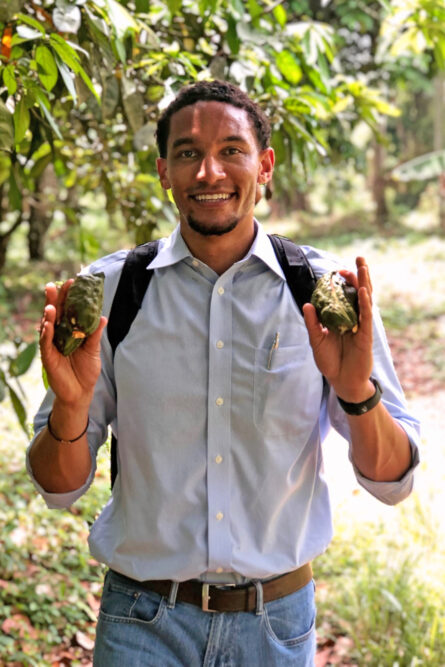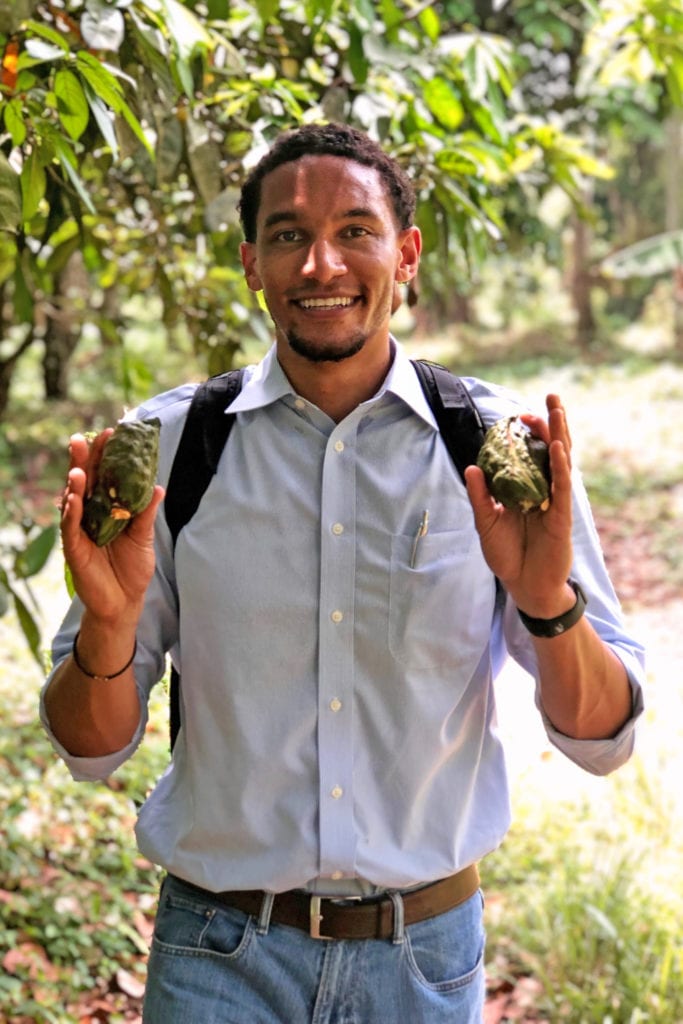
Home » Kamiakin High grads create Bissy energy drink from African nut
Kamiakin High grads create Bissy energy drink from African nut

September 12, 2019
A pair of Kamiakin High graduates have teamed up to create a natural energy drink that uses the kola nut, hoping to introduce the nation to an ingredient that’s been enjoyed in West Africa and other tropical climates for many years.
James Swinyard and Zach En’Wezoh borrowed $45,000 from friends and family to launch a pilot run of their product called Bissy, which is a colloquial term used by Jamaicans for the kola nut.
The energy drink comes in 3.4-ounce glass bottles with sustainable packaging and has a taste reminiscent of cola, with ginger, cinnamon and clove notes.
“We tweaked it to make it more uniquely-flavored toward the actual kola nut, a little more ginger-heavy,” said Swinyard, one of the innovators behind Bissy.
The kola nut was in the original Coca-Cola recipe, according to several articles about the closely-guarded soft drink formula.
Swinyard said if you were to taste the kola nut straight off the tree, “it would be like biting into a mushroom crossed with a plum that wasn’t ripe. It’s bitter, sour and earthy.”
The kola nut is indigenous to west Africa, where En’Wezoh’s family is from and how he first became aware of the fruit.
“Zach actually learned about this in a book that was written about his great-grandfather who was the chief of an area in central Nigeria,” Swinyard said. “He read about kola nut over and over again in this book and thought he needed to see what it was about, as a part of his heritage. He couldn’t find any products on the market that used kola nut, so he ordered the extracts, and he realized how much of a caffeine boost it had. He took it and said, ‘Whoa, I feel amazing.’ ”
Swinyard and En’Wezoh decided to harness both the caffeine and the theobromine found in the fruit.
They’re promoting Bissy’s sustained energy boost, saying it opens blood vessels in the lungs to retain oxygen and enhance performance.
A single bottle of Bissy contains enough caffeine to equal two shots of espresso.
Swinyard is marketing the product to bars and cafés, where it’s being mixed with rum, chai or sparkling water.
“In Nigeria, it was traditionally consumed only by men, but now women are eating it,” Swinyard said. “It used to be tradition for males that if you were coming over to my home, before we got down to business or chatted, we would break a kola nut or share it. So it’s a very communal thing. It connects you to the person you’re enjoying it with.”
After leaving Kamiakin High, En’Wezoh went on to Columbia University and Swinyard to Pacific Lutheran University.
Friends since age 9, the men have remained connected through a love for creating things and sustaining side projects.
“(En’Wezoh) and I were always launching side gigs, whether it was something we wanted to sell, or a blog, or something on the side to keep us busy. We’ve always been kind of side hustlers aside from our schooling and work,” Swinyard said.
The friends say they are the brains behind the “Run KANO” shirts that were popularized by students at their alma mater and still worn today. The phrase is meant to unite the school’s student body.
When En’Wezoh had a vision of marketing a kola nut project, he knew Swinyard was the one to call.
“He said, ‘You want to make this a thing?’ He knew I’d say yes because I’m always down for a side project,” said Swinyard, who now lives in Seattle and had been working to address the failures of products that could injure people.
En’Wezoh moved to San Francisco where he is a corporate paralegal.
The friends began working on the new project in July 2018, which resulted in an initial run of 10,000 bottles.
Swinyard said they’ve sold about half of them, available locally for about $3.69 at Highlands Organic Market locations in Richland and Kennewick and The Local in Kennewick.

“This fills a market that’s underserved because there’s non-consumption of kola nut in the U.S.,” Swinyard said.
He describes the energy boost as a more “comfortable climb” than a traditional caffeine rush from coffee, or from the ingredients he feels are “unnecessary” in other mass-marketed energy drinks.
“It will sell itself as long as we can get people to try it. It’s a feeling, not an ingredient,” Swinyard said.
The friends launched a 30-day crowdsourced fundraising campaign on Kickstarter in early September, with the goal of raising $30,000 to create 100,000 more bottles of Bissy and potentially launch two carbonated beverages.
“We’re confident we can meet our goal,” Swinyard said. “The idea is that you could be there on the ground floor and move from seeing something be kind of an idea, and something that exists, to being the person who helps us take it to regional or national distribution.”
Swinyard said the initial few days of the campaign are most crucial to getting the project placed on Kickstarter’s homepage, which could garner more clicks from the millions who visit the site daily.
“It doesn’t take that much to get there, because a lot of people launch products and they don’t have the support that Zach and I have, or the community that Zach and I have. So if we can garner that, we can go from a humble Kickstarter to a national story,” he said.
Swinyard promises any additional money raised beyond the requested campaign would go toward certifying their kola nut farmers as fair trade, which he cites as important to their mission.
“What we want to do is create the market in the U.S., fair trade our farmers in Nigeria, and increase the demand for their kola nut so we can start building up a structure for them and increase the ability for Nigeria’s agricultural sector to start being an economic driver for them,” he said.
Weeks before the launch of the Kickstarter campaign, Swinyard was working the sample counter at the Richland Country Mercantile, introducing customers to the product and hoping for more support ahead of the fundraiser.
“We’ve been aligning all of the pieces and then attacking each piece sequentially until we finally have arrived at this moment,” Swinyard said.
He recalled times they had just a few hundred dollars in savings before a backer would help get them through the next production phase.
“It’s all built up to this Kickstarter. You’ve raised $45,000 from friends and family, you’ve used a lot of your social capital and favors, and you’re here now and you’re at your secondary and tertiary connections that have enough money to take us to the next stage,” Swinyard said.
Contributions to the Bissy Kickstarter can be made at bit.ly/BissyKickstarter.
Local News
KEYWORDS september 2019





